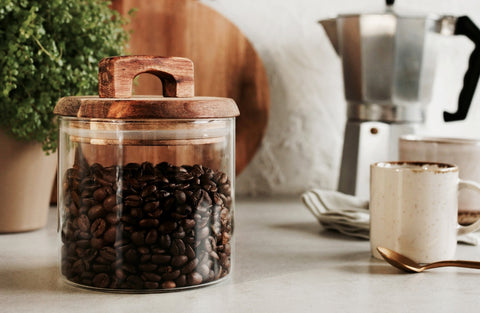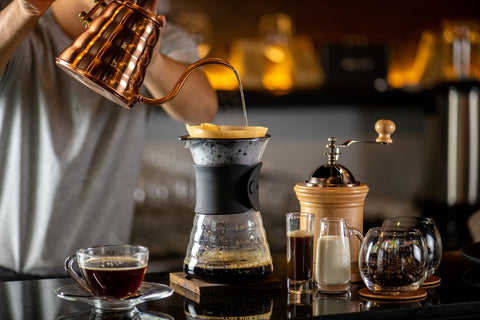Is My Coffee Stale? | Why Freshly Roasted Coffee is Best
There's something innately comforting about that first cup of coffee in the morning. It's a ritualistic start, a dependable constant in the daily lives of coffee lovers.
But as you enjoy your morning brew, do you ever stop to think about its freshness? Freshly roasted coffee could be the key to elevating your coffee drinking experience from good to great. In this article, we aim to clarify the different aspects of coffee freshness, the signs of stale coffee, and the importance of opting for freshly roasted coffee.
If you’re intrigued by the idea of swapping pre-ground coffee for freshly roasted coffee beans, Green Bean Coffee is here to help. We are a trusted supplier of green and freshly roasted coffee beans in Australia. Get the best coffee beans anywhere in Australia, online!
The Science of Coffee Roasting
Roasting is an act that mixes art with science. It's a process that transforms the green coffee beans into the aromatic brown beans that we're all familiar with. During roasting, the temperature inside the bean rises, leading to physical and chemical changes. The beans expand in size, lose weight, and take on a brown colour as the sugars inside caramelise, creating that distinctive coffee aroma and flavour.
The moment coffee beans are roasted, they begin to release carbon dioxide in a process called degassing, enhancing the coffee's aroma and flavour profile. As the beans age, the rate of degassing slows, reducing the freshness and leading to a stale taste. The key to an enriching coffee experience lies in understanding this degassing process and ensuring your beans are as fresh as possible.
If you’d like to learn more about the benefits of roasting your own coffee, read our comprehensive guide here.
Can Coffee Be Too Freshly Roasted?
As we discussed above, coffee becomes stale due to the release of carbon dioxide from the bean. You might think, then, that you should grind and brew your beans immediately after roasting.
Not true! In fact, similar to many fruits and vegetables, there is an ideal consumption point. Immediately after roasting, there is a large amount of carbon dioxide being released from the beans. Brewing beans immediately after roasting will result in a flatter flavour and less rich aroma, along with notes some have described as metallic and sharp. It can also result in a large amount of crema, which might seem ideal but can impact on the drinking experience.
Think of your freshly roasted coffee like a banana - consumed too early, you’re getting a flat, generic flavour; too late - and it is stale and unpleasant. Aim for the sweet spot and, much like that perfectly yellow banana, you’re set up for a delicious experience!
The length of time for ‘resting’ depends on the roast level. Dark roasts need less resting time in general than light roasts, due to the faster speed at which dark roasts degas. Dark roasts should rest for around 3-4 days, while lighter roasts may need up to 2 weeks to reach that optimal degassing stage. If you’re not sure how long to rest your specific bean or roast level, contact our coffee roasting experts.
Freshly Roasted vs. Stale Coffee: A Health Perspective
Coffee, beyond its beloved aroma and flavour, is packed with health benefits, largely due to its rich antioxidant profile. However, the antioxidant concentration varies greatly depending on the freshness of the coffee.
Freshly roasted coffee is a powerhouse of antioxidants, particularly chlorogenic acid, which is known for its anti-inflammatory, antidiabetic, and anticancer properties. These antioxidants help in neutralising harmful free radicals, thereby reducing oxidative stress in the body. Fresh coffee also has a higher nutrient density, including essential minerals like magnesium and potassium, which contribute to overall health. The caffeine in fresh coffee also helps to perk you up in the morning or during a long day at work–always a welcome benefit!
Comparatively, stale coffee has a lower antioxidant content. As coffee beans age, they lose essential nutrients and antioxidants, which diminishes their health benefits. This is due to the process of oxidation, where exposure to air causes the compounds in the coffee to break down. While stale beans aren't harmful, they certainly doesn't offer the same health benefits as their freshly roasted counterpart.

How Can I Keep My Coffee Fresh?
To capitalise on the flavour and health benefits of coffee, it's crucial to maintain its freshness for as long as possible. So, how can you ensure your coffee stays fresh? Here are a few tips:
- Buy whole beans: Whole coffee beans stay fresh longer as they have less surface area exposed to air. Plus, grinding coffee just before brewing ensures maximum flavour and nutrient retention. Pre-ground coffee can become stale in just minutes!
- Store correctly: Invest in airtight containers for your coffee. Store it in a cool, dry place away from direct sunlight.
- Mind the roast date: Pay close attention to the roast date on the packaging. It's best to consume coffee within a month of its roast date to ensure maximum freshness and health benefits.
Spotting The Signs: Is Your Coffee Stale?
As coffee enthusiasts, we often pay attention to the details that enhance our coffee experience, such as the origin of the beans, brewing technique, and even the perfect coffee-to-water ratio. However, one aspect often overlooked is the freshness of the coffee. Understanding the signs of stale coffee can have a significant impact on your coffee experience.
Coffee is a delicate product, and its freshness can be influenced by various factors such as the roasting process, storage, and even the age of the beans. All these factors can affect the taste, aroma, and overall experience of your coffee.
When coffee goes stale, it loses its vibrant, nuanced flavours, becoming flat and lifeless. This is because the essential oils that contribute to the rich, complex flavours of coffee evaporate over time, leaving behind a taste that can be described as dull or even bitter.
The aroma, or lack thereof, is another telltale sign of stale coffee. Freshly roasted coffee beans have a robust, intoxicating scent that fills the room when you open the bag. However, stale coffee lacks this fresh aroma, often smelling dull or even musty. This is because, just like the flavours, the aromatic compounds in coffee also degrade over time.

Embrace Freshness With Green Bean Coffee
The essence of coffee culture in Australia lies not just in the ritual of consuming the coffee but also in the appreciation of its sensory nuances. The journey of discovery begins with understanding the freshness of coffee. Why settle for a stale, lifeless cup of coffee when you can experience the joy of a brew made from freshly roasted beans?
When seeking out coffee, you’re guaranteed a mouthwatering cup with Green Bean Coffee. We prioritise freshness by offering premium-quality, freshly roasted and green coffee beans for home roasting. If you’re looking for top-quality coffee beans in Melbourne, Sydney or anywhere else around Australia, make Green Bean Coffee your first and only choice.
Frequently Asked Questions About Freshly Roasted Coffee
What causes coffee to go stale, and how quickly does it happen?
Coffee goes stale due to the oxidation process. When roasted coffee beans come into contact with air, they start to lose their flavour and aroma. The process of staling begins soon after the beans are ground, as the surface area exposed to air increases. Whole coffee beans have a longer shelf life, and can remain relatively fresh for a few weeks to a month, but once ground, coffee can start to go stale within minutes to hours.
How can I tell if my coffee has gone stale? Are there any visual or olfactory indicators?
Stale coffee can be identified by its lack of aroma and flavour. Fresh coffee should have a strong, pleasant smell, while stale coffee may have a dull or muted scent. Additionally, the taste of stale coffee will be flat, bitter, or lacking in complexity. It is essential to trust your senses, as your nose and taste buds can usually detect the changes in freshness.
Does the type of coffee bean affect how quickly it goes stale, and if so, which beans stay fresh longer?
Yes, the type of coffee bean can affect its staling rate. Arabica beans, due to differences in their composition and oil content, are likely to stay fresh longer than Robusta beans. Arabica beans have a more delicate flavour profile and are generally considered to be of higher quality. On the other hand, Robusta beans are more strongly flavoured and contain higher levels of caffeine, but they may go stale faster.
What are some best practices for storing coffee to maintain its freshness for as long as possible?
To maintain coffee freshness, follow these best practices:
- Store coffee in an airtight container to minimise exposure to oxygen and moisture.
- Keep coffee away from light and heat, as they can accelerate the staling process.
- Store coffee beans or grounds in a cool, dark place, such as a pantry or cupboard.
- Avoid storing coffee in the refrigerator or freezer, as the moisture and odours can affect the flavour.
- Avoid stocking up on pre-ground coffee. Grind coffee just before brewing to preserve the maximum freshness of the beans.
Can stale coffee be salvaged, and are there any methods to revitalise its flavour after it has gone stale?
While it is challenging to fully restore the original flavour of stale coffee, there are a few methods to improve its taste:
- Try using the stale coffee grounds for cold brew, as the extended steeping process can extract flavours even from older beans.
- Mix stale coffee with fresher beans when brewing, as this can partially improve the overall flavour profile.
- If you have a French press, use it to brew the stale coffee; the longer steeping time might help extract more flavours.
- Experiment with different brewing methods and recipes to find ways to make the most of the remaining flavours in the coffee.
